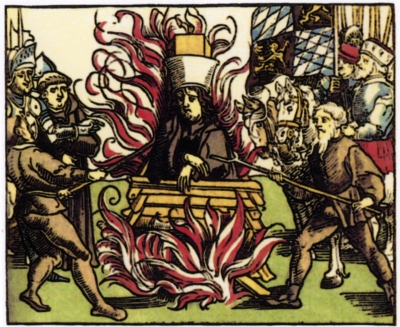 |
| Bad Hair Day: Execution of the Czech 'heretic' Jan Hus at the Council of Constance, anonymous woodcut, 1415 ©AKG-images |
THE NEW HUMANIST is a delightful site, at the other end of the intellectual rainbow from the GOP and its chimps, and well worth a visit anytime. Currently, there's a fascinating article about the Holy Inquisition. Why should you care, in a Stevie world, about stuff that happened 500 years ago? Well, Cullen Murphy believes its echoes are to be heard today:
Interrogation. Surveillance. Ethnic profiling. Censorship. The words come from 21st-century headlines, but they have an ancient pedigree. Inside the heresy files: how the Inquisition ignited the modern police state.
• • •
Here’s the central question: why did the Inquisition come into being when it did? Intolerance, hatred and suspicion of one group by another had always existed. Throughout history, these realities had led to persecution and violence. But the ability to sustain a persecution – to give it staying power by giving it an institutional life – did not appear until the Middle Ages. Until then, the tools to stoke and manage those embers of hatred did not exist. Once the tools do exist, inquisitions become a fact of life. They are not confined to religion; they are political as well. The targets can be large or small. An inquisition impulse can quietly take root in the very systems of government and civil society that order our lives.
As the Industrial Revolution progressed, people controls became more powerful. With the October Revolution in 1917, the Russian Marxists got their turn in 1930, with the supremacy of Stalin in the Party, and the advent of collectivization. From this effort to remake society, Stalin created the Gulag system. Richard Overy discusses this in an article on the NEW STATESMAN site, "The killing fields".
Once shrouded in secrecy, the history of the Soviet concentration camps is now well known. But why did these open-air prisons really exist?
• • •
The camp system has usually been regarded as a way of extracting compulsory labour for a rapidly industrialising Soviet economy, but Khlevniuk insists this was not its primary motivation. The camps were the product of a bizarre shift in the Soviet penal system in the early 1930s, when trivial infractions became state crimes. As a result, the conventional prison system became swamped. In effect, the camps were open-air prisons, easily assembled and cheap to run, and capable of accommodating millions. The labour extracted was unproductive, and many of the projects on which prisoners worked had little economic value. Free labour would have been more productive. And the slaughter of 700,000 in the Great Terror makes no sense if the regime's objective was the extraction of forced labour. The camps existed, rather, because of the regime's vision of a classless, productive and cultured communist society - a vision that required the violent exclusion of all those deemed by behaviour, social origin or ethnicity to be a threat to its achievement.
In his way, Stevie wants to do the same thing: remake Canada, starting with his crime legislation.

I remember reading that the Inquisition started the witch panic more or less on purpose, since after the suppression of the heretical movements in the south of France they were afraid they'd be out of their jobs. One of them lamented, IIRC, that there were "no more rich heretics" and that "It is a pity that an institution so salutary as ours should be so uncertain of its future."
ReplyDeleteAll dictators are paranoid, they need absolute control of everything.
ReplyDeleteSo did Hitler and Stalin. They lived in fear that everyone was out to get them. Stalin even murdered his own relatives. Some believe, Hitler killed his own niece.
The most important of all for dictators to control, is the media. Their dirty deeds, must not get out to the public.
Canadians only have to look at their own media, to understand that.